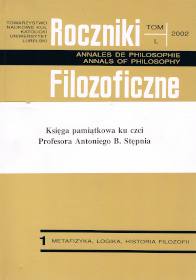Query and Knowledge in the Beginnings of Philosophy
Abstract
This article outlines the importance of asking questions in learning as it is presented in the beginnings of Greek philosophy: with the three Milesians (Thales, Anaximander and Anaximenes), in the Socratic and Platonic dialogues as well as in Aristotle. From the beginning, Greek philosophy was connected with asking questions to itself. The first philosophical question was the question about the ἀρχή. It served to demythologize and had an epistemological character. The meaning of the question about the ἀρχή was differentiated according to the meaning of the term ἀρχή. However, regardless of these differences, the question aimed to clarify the whole reality had to be sought outside of the facts, according to understanding. While with the Milesians we are dealing with the “fact” of asking questions with Socrates and later with Plato the question was clearly incorporated into the method of arriving at questions. The dialectic, that "game" of question and answer, was with Socrates and later with Plato a confrontation between one and another soul and initially served to find the truth together. In the field of elenctics the question played a therapeutic role, but in the field of maieutics it played a stimulating role. The Socratic dialectic did not concern material reality, but the human imagination of reality and led to new knowledge that was purely intellectual. According to Plato's teaching, the question was a means of getting to what is intelligible, i.e., to the idea. Knowledge became memory, anamnesis, and the impulse for remembering the idea was, among other things, the question. We find the beginning of the theory of the question in Aristotle's writings on logic. He did this in the context of the syllogism and the theory of doctrine. He saw the question as building material for any discussion. He distinguished four types of questions depending on what we ask for, and four types of questions depending on what knowledge we achieve, which can be traced back to the knowledge of ὅτι and διότι. The prerequisite for each of these questions is the lack of knowledge. Aristotle brings some new elements into the phenomenon of the meaning of questions in the course of knowledge: he shows the logical order of the question. He places asking questions in the domain of practical skills that serve the acquisition of knowledge, and he points out that the content of the answer and the kind of knowledge gained depend on the type of question asked.
Copyright (c) 2002 Roczniki Filozoficzne

This work is licensed under a Creative Commons Attribution-NonCommercial-NoDerivatives 4.0 International License.





